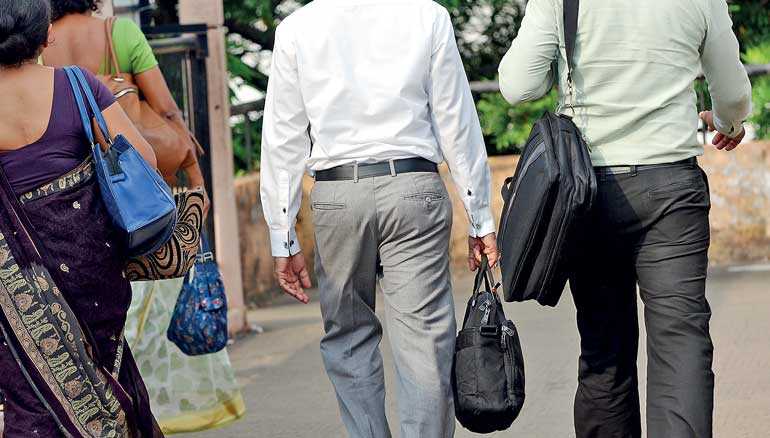Sunday Feb 15, 2026
Sunday Feb 15, 2026
Tuesday, 29 September 2020 00:47 - - {{hitsCtrl.values.hits}}

As a country looking to recover and reinvigorate its economy, Sri Lanka is in dire need of a workforce with international exposure and skills. The current domestic workforce suffers from a deficiency in experts with the language skills and international experience to handle the pressures of an increasingly globalised world – Pic by Shehan Gunasekara
With the possibility (at the time of writing) of the 20th Amendment to the Constitution removing the 19th Amendment’s restriction on dual citizens becoming MPs, it is worth considering why such a move is necessary. As an issue that would affect a relatively small number of people, the arguments in favour of protecting the right of dual citizens to candidacy have not received enough consideration. This article therefore attempts to summarise a few reasons why it actually matters whether dual citizens have the right to contest elections and enter parliament.
Equality
Any citizen of a democratic country has an interest in meaningful political participation. This is not necessarily predicated on their likelihood of engaging with the process, but on the basis that the existence of this avenue legitimises the enforcement of the law by the state. 
Political participation is a condition of democracy – it gives each citizen an equal stake in the political process that formulates laws and therefore justifies the social contract that requires them to obey it.
Whilst the right to political expression is widely accepted as a fundamental right, the limits of its extension to the right to seek election varies in national jurisdictions. However, the ability to seek election provides a unique avenue of political expression. It enables a person to influence public discourse, open up access to media and to affect the political agenda in a way otherwise impossible without candidacy. The political expression and autonomy of an individual who is barred from candidacy is therefore severely impacted relative to someone who is not. In recognition of this reality, Article 25 of the International Covenant on Civil and Political Rights enshrines both the right to vote ‘and’ to be elected.
If preventing a certain group of citizens from candidacy represents a restriction of their rights, then what does this mean for equality? The Constitution of Sri Lanka states that no distinction shall be drawn between citizens of Sri Lanka for any purpose by reference to the mode of acquisition of such status. Furthermore, the principle that no citizen shall be discriminated against on the grounds of place of birth is recognised in the Constitution as a fundamental right. This is difficult to reconcile with a bar on dual citizens in Parliament.
If, for example, a Sri Lankan was born in a country (such as in many countries in the Americas with ‘jus soli’ laws) which provides automatic citizenship at birth, they would immediately be disadvantaged due to their place of birth. They would not only be inconvenienced by having to renounce citizenship but would also have to go through the long process of renunciation, pay the fees and be subject to any delays in that process before the election. Such a burden immediately poses a barrier to entry that other citizens would not have to face.
This results in a two-tiered system where the political rights of one group are less than the other. A dual citizen is no less Sri Lankan and indeed the fact that they have kept dual citizenship is in itself an indication that they did not want to abjure their Sri Lankan identity. Wouldn’t this form of restriction of political rights be unacceptable if it was based on race or religion?
Bringing in talent
Sri Lanka has a significant issue of ‘brain drain’. This is a phenomenon where large amounts of highly skilled and educated people leave for greener pastures abroad in wealthier countries. There are vast numbers of talented Sri Lankans abroad who go to study and stay on to work – with many going on to gain dual citizenship and have children there. As a country looking to recover and reinvigorate its economy, Sri Lanka is in dire need of a workforce with international exposure and skills. The current domestic workforce suffers from a deficiency in experts with the language skills and international experience to handle the pressures of an increasingly globalised world.
The issue here is not about how many of these people would actually want to go into politics. It is about the message being sent to them when they are treated separately and denied political rights. There is a pressing need to counteract Sri Lanka’s brain drain problem and to encourage those abroad to return. The right to engage in the political process is symbolic and the denial of that right conveys a degree of hostility that may dissuade people from returning. The perception will be that they are treated as effectively second-class citizens who can vote but not be voted for.
Another way that bringing in talent helps Sri Lanka is by having a direct effect on the political process by widening the range of potential candidates. With many parliamentarians perceived as being underqualified for the role of lawmakers, it would help the nation to provide voters with greater opportunities to vote for qualified candidates who have lived abroad. A Sri Lankan professional living abroad will have had to work hard and gain skills that could be transferable in helping to develop the nation. The mere act of including the dual citizens immediately widens the pool of potential candidates, giving voters more choice and enhancing the democratic process. It could even be argued that those who decide to return to serve the country despite the possibility of earning more abroad demonstrate greater commitment than those who have no other option.
The 19th Amendment’s political objective
When the Yahapalana government came into power, there had been no public outcry clamouring for the removal of dual citizens from public office. It was a non-issue. Yet they decided to not only prevent dual citizens from being parliamentarians (and by extension President), but to increase the age for eligibility to be elected President, from 30 to 35. Only the most charitable (or naïve) would dare interpret this as anything less than a blatant attempt to prevent anyone from the Rajapaksa family (i.e. Gotabaya, Namal and Basil) from defeating the Yahapalana government.
This was an egregiously anti-democratic move. Even the most fervent anti-Rajapaksa person would have to concede that the altering of the Constitution solely to prevent your opponent from winning an election is an appalling abuse of power that cannot be compatible with democracy. Not only that, but an entire subset of people (dual citizens) were deprived of their political rights merely because the Yahapalana government feared a Rajapaksa comeback.
The successful election of Gotabaya Rajapaksa as President demonstrated that people wanted to vote for him. This simple fact, regardless of anyone’s political views, should reveal how these provisions had the potential to disenfranchise millions of Sri Lankans who would not have been able to vote for the candidate they wanted to win.
If the 20th Amendment ends up repealing these provisions, it would rectify an unjust state of affairs and allow dual citizens to have equal political rights as their peers.
Conclusion
The decision on whether the provisions in the 19th Amendment relating to dual citizens should be repealed must be based on a cost vs. benefits analysis. If the policy results in a situation where an entire group of Sri Lankans are denied their political rights, treated as unwelcome and citizens are effectively disenfranchised – then is that not too high a cost for a policy for which there was no public support in the first place? If the public truly opposed the election of dual citizens to parliament, then wouldn’t it make more sense to allow them to express that sentiment through their votes? Surely the results of the last Presidential election have shown how little people cared whether or not their candidate had been a dual citizen.
The decision to allow dual citizens to contest should not be a partisan issue, it is an issue for all Sri Lankans who value the democratic process and welcome the contributions of all Sri Lankans – wherever they may have lived.
(The writer is Barrister-at-Law (England and Wales) and Researcher in International Law at the University of Durham.)